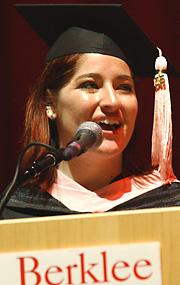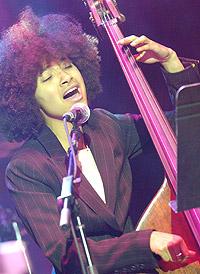Degrees of Change: Commencement 2005 Feature Story
Talent and confidence in abundance, Berklee's newest graduates step out

Stephanie Gourley
Berklee's class of 2005 arrived in Boston at a time when it was easy to be pessimistic about the future. The terrorist attacks of September 11, 2001, occurred on the second day of freshman classes, and as students coped with its aftershocks and began to refocus on their music education and future careers in a struggling industry, they could be forgiven for, as commencement student speaker Stephanie Gourley stated it, fearing "the worst."
"We saw war, we saw protest, and while we struggled to make our tuition payments, we saw economic downfall," said Gourley during her speech at Saturday's commencement. "We came into college at the end of Napster. We sat in Harmony 3 while the Recording Industry Association of America sued its own customers. With every graduating friend, we heard rumors of studios closing, recording companies laying off employees, and fewer and fewer clubs holding open mics."
But Gourley's message ultimately was one of optimism, grounded in the idea that her nearly 700 classmates, having survived the rigors of four years at Berklee, are well prepared to lead the effort to build a more stable future for the music business. "If Berklee graduates don't fix it, I ask you, who will?" she said.
Such hopefulness was on display throughout the weekend, from a series of stellar student performances at Friday's commencement concert to the reassurring presence of the three honorary doctorate recipients, one of whom was Berklee alumnus Kevin Eubanks '79, a jazz guitarist who now holds a highly coveted job, music director of the Tonight Show Band. One of the commencement ceremony's most humorous moments came when president Roger Brown handed Eubanks a box of guitar picks, an ironic nod to Eubanks's fingerstyle approach to playing. His choice to play without a pick when he was a Berklee student was a point of controversy between him and his teachers at the time, but Brown's gift and Eubanks's shoulder-shaking laughter signaled that all had been forgiven.
The other two honorees were legendary jazz bassist Ron Carter, who delivered the commencement address, and r&b vocalist Anita Baker, whose comments about the previous night's commencement concert made it clear that she feels the students are ready now for careers as professional performers. "I was on my feet pretty much the whole time," said Baker in an interview just prior to the commencement ceremony. "I was energized. I was humbled. I was enthused. I'm hopeful. Because all that I get to see through various media outlets is prefab, synthesized, canned music. But what I experienced last night was musicianship, which is just pretty rare these days. It's great to know it's still alive and there's another generation coming to the helm." Many graduates are already playing professionally, such as drummer Leslie Cleveland, who has performed with Prince, Patti LaBelle, and Roberta Flack, among others. Jazz bassist Esperanza Spalding, who led a trio in a three-song tribute to Ron Carter at the commencement concert, has played behind artists such as Joe Lovano, Regina Carter, and Michel Camilo.
Commencement began with Marilyn Brock, interim senior vice president for academic affairs, reeling off a series of statistics that helped form a profile of the graduating class. The graduates—which included 198 women and 498 men—ranged in age from 19 to 57, with 33 percent of them international, representing 51 countries. Los Angeles was the city with the most graduates, underscoring Berklee's appeal even to those living in the music industry's capital.
In his commencement address, Ron Carter gave practical advice to the aspiring professionals in the audience. But he also went beyond nuts and bolts and urged graduates to make music sympathetically and generously.
"You can bring compassion through your music," said Carter. "By that I don't mean a concern about whether this is the right or best song for the occasion, but a concern for your fellow human beings. Show them that you care for each and every one of them, that you share in their good times and bad times, that you welcome the challenge of trying to improve a situation."
Carter had a chance to see how well students were achieving that goal when he joined Baker and graduating students and their families at Friday's commencement concert. It was a night filled with impressive performances, including multisong tributes to each artist.
Guitarist Brian Baker, who was awarded the Billboard Endowed Scholarship before the concert, was featured on all three Eubanks compositions. Five tunes honoring Ron Carter brought bassists Spalding and Frank Abraham to center stage. One of the songs was "Espera," written by Spalding and spotlighting her talents as both a bassist and vocalist.

Esperanza Spalding performs "Espera."
Five vocalists took turns on five Anita Baker tunes, putting their own soulful stamp on her hits, including Evan Baughman ("Sweet Love"), Nadine Ford ("You're My Everything"), Jeremy Ragsdale ("Giving You the Best That I Got"), Natalia Fernandez ("Same Ole Love"), and Kamaria Ousley ("No One in the World").
While the work of the honorees made up the bulk of the program, the concert also featured several student compositions, two of them written for a three-song set by the Berklee Hip-Hop Ensemble, Brian Ellis's "Come On" and Lee Moretti's "Spoken Word." The concert ended with another student-penned song, "We Are All Connected," written by Andrea Whaley in tribute to the women of Darfur, Sudan.
Outstanding student performances are always the driving force of Berklee commencement concerts, but to also hear as much music written by students as by any one of the honorees reflects the originality of the college's young artists. It is, after all, Berklee's core mission to help musicians develop their individuality as music professionals, a point President Brown stressed during commencement, his first since taking the position last year.
"Now it's your time. It's important for you to go out there and say what you have to say, and remember who you are," Brown said in a video students produced for the ceremony. "The world doesn't need you to be like someone else. It wants you to be who you are and I'm confident that if you do that you will have a great and successful life and career."
